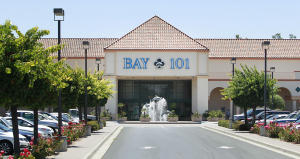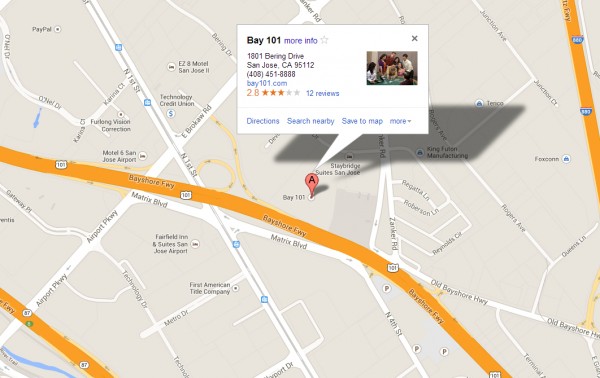
Bay 101 card room in San Jose plans move next to Casino M8trix
SAN JOSE — Casino M8trix’s opening a year ago aimed to give San Jose a taste of Las Vegas glitz. Now Bay 101 wants to follow suit with a modern card room and hotel complex right next door, solidifying a piece of North First Street near the airport as the city’s gambling center.
Like their sole city competitors at M8trix, Bay 101 says the move is needed to compete with the lure of luxurious tribal casinos.
Bay 101 consultant Erik Schoennauer said the move from the card club’s nearly 20-year-old casino on Bering Drive, expected to be completed by 2017 when its current lease expires, would help it stay abreast of gaming industry trends. Card rooms facing competition from tribal casinos have been expanding their offerings to include restaurants, sports bars and hotels with meeting space to capture a broader market.
“To compete in northern California, we have to have a modernized facility,” Schoennauer said. “We think there’s great synergy having Bay 101 and Casino M8trix right near each other with a convenient pedestrian connection between the two. We think it’s mutually beneficial and has the prospect of creating an entertainment zone at North First Street and Highway 101.”
The same competitive pressures spurred the old Garden City Casino’s relocation from Saratoga Avenue, its home of more than 30 years, to Airport Parkway, where it has rebranded as Casino M8trix. It opened a year ago in a $50 million building featuring a 165-foot, eight-story tower, sports bar, programmable LED lighting and a custom aroma. Casino M8trix plans a hotel at the site, along a cross street they had the city rename Matrix Boulevard.
Casino M8trix co-owner Eric Swallow said he welcomes Bay 101 as a neighbor on his side of the freeway.
“We love the competition,” Swallow said, “and they obviously understand the grass is greener the closer you get to Casino M8trix.”
Like Casino M8trix — the only other San Jose card room allowed under city law — Bay 101 also sought to shed its rented digs for its own property. San Jose’s thicket of card room regulations can make relocation difficult, and put Bay 101 at a disadvantage in negotiating leases. Casino M8trix’s owners bought the Garden City card room out of a bankruptcy resulting from a landlord dispute.
Last fall, the Bumb family, which owns Bay 101 as well as the San Jose Flea Market, bought the San Jose Airport Hotel property at 1740 N. First St., opposite the M8trix. The plan is to raze the existing hotel and replace it with a card room and two new hotels. A conceptual site plan filed last month with the city suggests a card room totaling 87,000 square feet in two stories, plus a 10-story, 240-room hotel and nine-story, 230-room hotel. There would be restaurant space, office space, and conference and meeting rooms.
Schoennauer said the plans are still preliminary and that Bay 101 is now thinking the new card room will occupy a total of 120,000 square feet. The current card room totals 72,000 square feet. The planned alignment of the hotels and card room, which currently has the club at the point of the triangle-shaped parcel with a hotel on either side, also may change, Schoennauer said.
By comparison, Casino M8trix totals 89,000 square feet. Owners there envision an adjacent hotel of about 350 rooms.
One thing that won’t change at either card room is the limit of 49 card tables, set by city law. Last fall, San Jose voters rejected a Bay 101-sponsored ballot measure, which both clubs backed, that would have allowed each an additional 30 gaming tables.
Bay 101 also isn’t planning gambling on multiple floors. The card room opposed M8trix’s plans to allow additional gaming on the top floor of its tower. Casino M8trix is suing San Jose over police refusal to permit it.
The modernization plan wasn’t inspiring card players taking a break outside Bay 101. Mitch Arreola, 34, of San Jose, wishes San Jose would allow the clubs more card tables.
“We don’t care where they move,” Arreola said. “We just want more tables.”
Some veteran San Jose poker players are unsure about the transformation of the city’s card room culture.
“I like it the way it is now,” said Tony Randall, 43, of San Jose, taking a cigarette break outside Bay 101. “I don’t want San Jose to become like the Vegas strip.”
It’s unclear what would happen to the existing Bay 101 building, built for the card room on leased property. Public hearings have yet to be scheduled on the Bay 101 project. But city officials don’t expect the new location to be a problem, since the City Council already blessed the M8trix’s move to that area.
“When we looked at M8trix, we concluded this was one of the best areas in the city to accommodate card rooms,” Planning Director Joe Horwedel said, noting it’s not near homes and has access to the airport, light rail and freeways.
In their reinvention efforts, both San Jose card clubs are taking cues from the Commerce Casino near Los Angeles, which opened in 1983. It bills itself as the “largest card casino on Earth,” with 243 gaming tables, an adjacent 200-room hotel, spas and restaurants.
The San Jose card rooms say they need to offer a variety of entertainment, food and lodging to compete with tribal casinos seeking to lure gamblers away from San Jose. Bay 101 officials suspect tribal gaming interests bankrolled opposition mail to last year’s failed San Jose card room expansion measure, portraying it as an invitation to higher crime. Bay 101, and to a lesser extent Casino M8trix and labor groups, had spent more than $1.5 million promoting the measure.
The San Jose card rooms say their fortunes are tied to those of the city, which reaps more than $15 million a year from the two clubs — more than it does from auto dealerships — thanks to a 15 percent card room tax, as well as fees of about $1 million each to pay for police oversight.
And despite the clubs’ business rivalry, Schoennauer said being next door to each other would benefit both.
“If people feel they’re not having luck at one place,” Schoennauer said, “they may want to walk to the other.”
Contact John Woolfolk at 408-975-9346. Follow him at Twitter.com/johnwoolfolk1.
Bay 101 timeline
1929: Founded as Sutter’s Club in San Jose’s bayside Alviso area.
1961: The founder’s son, Joseph Sutter Jr., adds poker tables.
1992: Highway 237 widening in forces the club’s relocation to its current 72,000-square-foot site on Bering Drive off Highway 101. The rebranded Bay 101 Casino opens there two years later.
1990s: A wave of card-room-linked criminal cases in the late 1980s spur a city crackdown, limiting San Jose to its two existing card rooms, prohibiting them from contributing to political candidates and requiring voter approval for expansion. The two card rooms spend years fighting San Jose in court over city efforts to end 24-hour gaming operations. A settlement allows 24-hour operations but not for individual gamblers.
2010: Voters approve a ballot measure raising San Jose card room tax from 13 to 15 percent and allowing each an additional nine tables.
2012: Rival Garden City Casino opens a modern card room, Casino M8trix, across the freeway from Bay 101. Voters later reject Bay 101-sponsored ballot measure that would have allowed each of the two city card clubs an additional 30 tables.
2013: Bay 101 submits plans to move next door to Casino M8trix and build a modern card room totaling 120,000 square feet along with two hotels on the site of the existing hotel.



